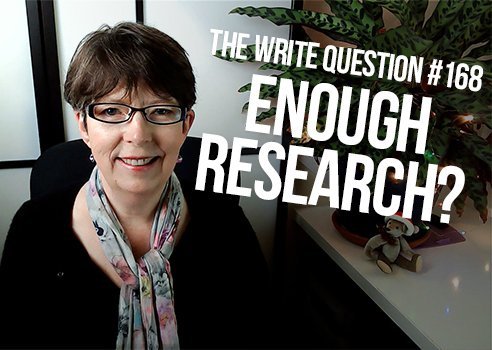Viewing time: 4 mins 52 secs
The Write Question is a weekly video podcast about writing that I started in 2017 and that ran, more or less weekly, until April 2022. This is a republication of issue #168, which addresses how much research is enough. The post first ran on Dec. 18/20.
Transcript:
How much research is enough? That’s the topic I’m addressing today in The Write Question. I’m Daphne Gray-Grant, the Publication Coach, still in pandemic mode.
I have a question from Svetlana Tvorogova, a writer based in Belgium. Here’s what she’s asked by email….
“How do you measure saturation — or the finishing point — in both research and writing? In other words, how do you know whether you’ve accomplished enough to address your chosen issue? Are there any objective criteria or does it remain a matter of personal judgement?”
Thanks for your question, Svetlana. It’s an important one and it’s bedevilled writers for centuries. How do I know my book, paper, report, blog post or dissertation is any good? My quick response is that it’s basically a matter of judgement.
But my more measured answer is that there are a few criteria you can use before you form that judgement.
Let’s talk about research first. I have six tips:
1 – Be sure you’re asking yourself a reasonable question for the length you have to write. You can’t make a thorough analysis of quantum physics in a thousand words. Nor can you write 50,000 words on a single poem by William Carlos Williams. Make sure your question matches the length you have.
2 – Don’t get into too much detail too fast. Begin your research with an overview so you can get the lay of the land. If there’s a textbook available, that might be a good place to start. Don’t begin with a Google search! Get an overview first.
3 – Ask for some help from friends and colleagues. Do any of them have enough expertise in your field to be able to help you? Or do they know someone else who could? Spending 20 minutes with the right expert could save you a lot of time.
4 – Have a clear place to SAVE your research. I recommend using software so you can search it easily. For academics, I suggest Mendeley, Zotero, Citavi or Endnote. For non-academics, I recommend Evernote. See links to all these programs in the shownotes below.
5 – Keep a research diary. Being an effective researcher is about a lot more than “gathering” information. You are not someone walking on a beach collecting pretty shells. You need to form an OPINION about what you’re reading. A research diary is a safe place to do that and will help your writing immeasurably. See link below.
6 – Don’t feel you have to know everything before you start writing. I always suggest that people start writing when they feel about 80% finished with their research.
And by the way, when you get to the point that you start seeing the same information repeated again and again, that’s a clear sign that your research is done!
As for knowing when your writing is good enough to hand in or publish, the question is trickier. This is because we are all really bad judges of the quality of our own work.
I generally suggest that, where possible, writers allow themselves six weeks before they start trying to edit what they’ve written. But, when it comes right down to it, even six weeks isn’t enough time.
At a certain point, we have to give up and say, “I just don’t know whether this is any good.” Professional writers face this problem too, and they solve it by using professional editors.
If you’re not in a position to hire a pro editor yourself, I suggest you look to a colleague or friend and ask them to read your work and give you some honest feedback. Don’t pick too close a friend to do this, and certainly not a family member. You want to someone who’s going to have the confidence to tell you your work needs improving, if it does.
Finally, let me wrap up with a quote from American author, anthropologist and filmmaker Zora Neale Hurston: “Research is formalized curiosity. It is poking and prying with a purpose.”
Svetlana, it’s always incredibly difficult to know whether we’ve done a good job with researching and writing. We get too close to the material and we lose all sense of perspective. This is where you need to rely on the wisdom and the opinion of others.
*
If you’d like to learn more about how to make writing a happier and more rewarding process, check out my latest book Your Happy First Draft. I don’t sell it in bookstores or via Amazon. The only place to buy it is on my website, link on the screen below and in the show notes.


